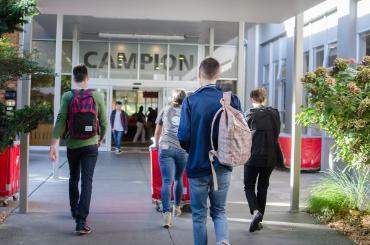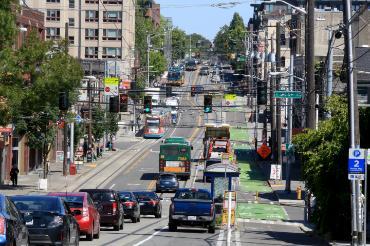Campus Safety
At the Department of Public Safety, we recognize the unique experience of attending school in the heart of an urban environment. We aim to create the safest environment possible for all community members and visitors on our 50-acre campus.
/0x27:2400x1558/prod01/channel_34/media/seattle-university/public-safety/images/SpringOnCampus2013_cjt_024.JPG)
Living on Campus

Seattle University is home to over 2,000 students living in 7 on-campus residences. As a department, we are committed to aiding all on-campus residents in feeling safe in their residences. Along with our full-time officers who are available 24-hours a day, 7 days a week, we employ student officers who assist and support the safety of residence halls during night time hours. We offer many services, such as walking safety escorts, to help students feel safe on campus at all times of the day and night.
Living in Capitol Hill

Seattle University is an open and accessible campus situated in the First Hill and Capitol Hill neighborhoods of Seattle. Living in such a vibrant community presents a very unique experience in the heart of the city. We understand that visitors enjoy our campus every day and it is our goal that everyone visiting our campus is following all university policies and procedures to foster a safe and welcoming environment for all.
Safety Tips
PERSONAL SAFETY
You are your best personal safety tool, always be alert and aware of your surroundings.
If You Sense Potential Danger
Assess the situation, then take action. Get as far away from the potential threat as you safely can. Try to join any group of people nearby or cross the street and increase your pace. If it is dark out, get to a well-lit area and contact police immediately. If there are people nearby, alert them to the potential threat. If you see someone else in trouble, call the police immediately. Provide the police with as much information as possible, including suspect description, location, vehicle information (if any) and last known direction of travel.
Call the Department of Public Safety emergency line at (206) 296-5911 with a brief explanation of the incident and your location and officers will respond immediately.
If You Are Victimized
Although your safety is maximized when you follow security precautions, you may still be the victim of a crime. Your reaction can affect whether or not you are physically harmed, so you should prepare for how you might react under a variety of circumstances. If you think your life is in immediate danger, use any defense you can think of (screaming, kicking, and running).
If you are facing an armed criminal, the risk of injury may be minimized by cooperating with their demands. In a violent crime, it is generally ineffective for the victim to cry or plead with the attacker. Such actions tend to reinforce the attacker's feeling of power over the victim. Avoid sudden movements and give the criminal what they want.
Other types of resistance, however, have often been successful; you need to decide in advance what actions you are prepared to take. Self-defense training is one method by which you can learn avoidance
strategies and resistance techniques. Contact us at (206) 296-5990 to inquire further about self-defense training.
Bias and Hate Crime Incidents
A hate crime is defined as a crime, typically one involving violence that is motivated by prejudice on the basis of ethnicity, religion, sexual orientation, or similar grounds. Even if a perpetrator is incorrect about a person’s actual identity, if they commit acts against a person based on their perception, these acts may still be considered a hate crime.
If you have been the victim of a hate crime please contact Public Safety by calling (206) 296-5911. Tell the officer the exact wording, or as much as you can remember, of what the perpetrator said to you, regardless of how offensive it is.
Sexual Assault
Seattle University and the Department of Public Safety are committed to investigating any report of sexual assault using trauma informed response and a purpose to support and care for our community. Remember, no one has the right to force or pressure another to have sex, regardless of past consent, sexual history, dress, or circumstances.
Don’t hesitate or be embarrassed to ask a friend or Public Safety officer to escort you. If you are asked to escort another person, please do so with courtesy and consideration. Helping to keep the campus safe is everyone's responsibility.
Report the activity to Public Safety and your local police. For more information on Title IX, please visit the Office of Institutional Equity (link)
For more information, you can contact:
- Seattle University Department of Public Safety: (206) 296-5990
- Seattle University Counseling and Psychological Services: (206) 296-6090
- Harborview Medical Center (206) 774-3000
- King County Sexual Assault Resource Center: (888) 998-6423
WALKING SAFETY
If you ever feel unsafe walking on campus, contact Public Safety for a Walking Safety Escort at (206) 296-5990.
Always stay alert and be aware of your surroundings. Keep your eyes up and off your phone. If you are using headphones, keep the volume down so you can still hear your surroundings. As you walk, take note of the emergency phone locations on campus.
If a stranger tries to engage you in conversation, use discretion before stopping to talk. It’s a good idea to say you’re in a hurry to meet someone. If you encounter anybody who appears suspicious or makes you uncomfortable, never hesitate to call Public Safety.
Avoid walking alone at night. Walk with a friend or contact Public Safety for a Walking Safety Escort. When walking at night, stay in well-lit areas.
Follow the rules of the road and be aware of vehicles and bicycles. Always walk on sidewalks when possible. If there is no sidewalk, walk in the direction opposite of traffic.
LIVING ON CAMPUS
If you see any suspicious or unusual activity, call Public Safety at (206) 296-5911.
It’s important for everyone to work together to ensure the safety of our residence halls. By following the safety precautions below, you can minimize the risk of crime on campus.
Don’t prop open public residence hall doors or fire exits. Meet visitors at the main entrance. Make sure you aren’t allowing strangers to “piggy-back” into the building with you. If you feel uncertain about someone, trust your judgment.
Don’t allow strangers to enter your room. If a stranger does enter your room, demand that they leave immediately. If they refuse, create a commotion and leave quickly. Contact Public Safety and Housing staff immediately.
Store your valuables in a safe location. Personal belongings should never be left unattended, even in your residence hall lounge. Make a record of the serial number, model, brand name, and a description of all valuables. Stolen property can only be lawfully reclaimed if it is positively identified.
VEHICLE SAFETY
Vehicle theft and car prowling are both crimes of opportunity. Here are some steps you can take to be proactive in keeping your vehicle safe from being prowled or stolen.
- Consider installing a vehicle alarm system or another theft deterrent device.
- Park your vehicle in well-lit designated parking areas.
- Make sure that all windows and doors are secured before you leave your vehicle.
- Don't leave valuables visible in the vehicle. Either place items in the trunk or take them with you.
- If you observe suspicious behavior (e.g. a person looking into parked vehicles, loitering in or around parking lots or vehicles) contact Public Safety at (206) 296-5911.
- Always keep all doors and windows closed and locked when occupied.
To learn more about having a vehicle on campus, please visit Transportation and Parking Services.
BICYCLE SAFETY
Seattle is known for its large community of bicycle riders. If you choose to ride a bicycle on campus or around Seattle, it’s important to keep safety for you and your bicycle at the forefront.
Always wear a helmet while riding a bicycle. Wearing an effective and properly fitting helmet drastically reduces the risk of a head injury when in an accident. Make sure your helmet has passed all safety standards by checking for a “CPSC” or “Snell” sticker inside.
Learn the rules of the road and obey all traffic laws. Always be aware of vehicles, pedestrians, and other bicyclists around you. Stay alert.
Bicycle Locks
Cable type locks are easily cut with store bought bolt or wire cutters and may increase the chance of bike theft. Public Safety data has found that the best bicycle security is a case hardened 3/8-inch chain link bicycle lock. If you are using a U-bolt style lock, use 2.
Be sure to place your lock around both the frame of the bicycle and the front wheel. Securing only the front tire can still result in a stolen bike- minus the front tire- since it is often easy to remove.
If it can be removed, it can be stolen! Adjustable bike seats are a good example of accessories that can be stolen. If you have a removable seat, the best security method is to simply take the seat with you. However, a bicycle seat can also be locked to the frame. This method will slow down and deter all but the most determined thief.
PUBLIC TRANSPORTATION SAFETY
Using public transportation is an efficient way to travel through the city. Use these tips to make your commute safe and easy.
- Use the public transportation schedules to minimize the length of waiting time.
- Plan your route to use the busiest, best-lighted stop possible, both to get on and off at a stop.
- Be sure to have your fare out and ready before you board.
- If there are few people on the bus, light rail, or streetcar sit near the driver or large groups of people.
- Keep your belongings in your lap, on your arm, or between your feet -- not by themselves on an empty seat.
- If someone is bothering you, tell the driver/operator, or call 911.
- If you feel uneasy about getting off at your usual stop, stay on until the next stop.
We're here to help
Officer coverage 24/7
1313 E. Columbia Building
Business office: Mon-Thurs, 8:30 a.m. to 4:00 p.m.